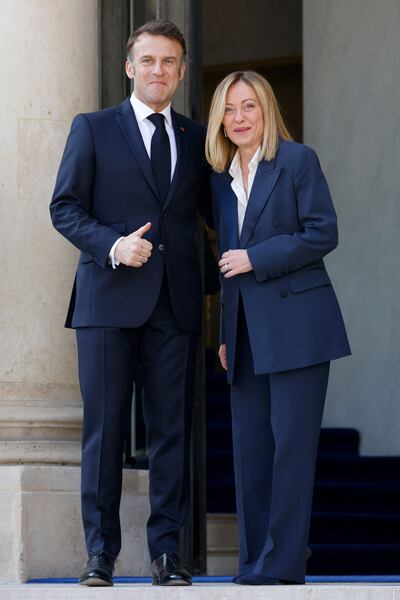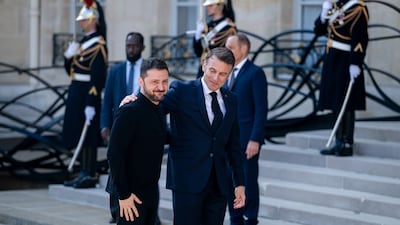Splits emerged on Thursday in efforts to create an allied coalition of peacekeepers in Ukraine, with Britain and France deciding to despatch a "reassurance force" to the country to prepare for the end of the war with Russia.
Thirty European allies, including Ukrainian President Volodymyr Zelenskyy, were brought together by French President Emmanuel Macron and British Prime Minister Keir Starmer for the latest in a series of summits on the deployment, which would involve Europe stepping in to back Kyiv, if US talks with Russia over a ceasefire come to fruition.
Not all participants were willing to move at the pace of the UK and France. "There will be a reassurance force with several European countries who will deploy," Mr Macron said.
"It does not have unanimity today, but we do not need unanimity to do this," he added, saying a Franco-British delegation would travel to Ukraine in the coming days to discuss the move and the future of the country's army. "These reassurance forces are a British-French proposition that is desired by Ukraine," he said.
Mr Starmer put it slightly differently, saying Ukraine should be in the strongest possible position as negotiations on its future take place. "We discussed further the plans for reassuring the peace, the 'coalition of the willing' and the military and operational plans, whether they're on the land, the air or the sea, but there was very strong support," he added. "We will be ready to operationalise a peace deal, whatever its precise shape turns out to be."
Mr Macron emphasised that members of a "reassurance" force were not destined to be peacekeepers, deployed on the front line or acting as any kind of substitute for the Ukrainian army. Not all of Ukraine's European allies would be represented in the force, with some states lacking "the capacity" to do so and others reluctant to join because of the "political context".

Yet despite the reluctance of some to start moving into Ukraine, the French President said the "Europeans are much more united than they were a few weeks ago".
After the Paris summit, a Franco-British delegation would begin talks over where such a force could be sent. It would have the "character of deterrence against any potential Russian aggression", Mr Macron said.
In addition, new training programmes for the Ukrainian army were approved in Paris by several European countries, as well as the acceleration of "loan disbursements to partially enable Ukraine to facilitate artillery purchases".

Mr Macron wants to "prepare what the format of the Ukrainian army of tomorrow will be". That includes discussing "what land force? What maritime capacity? Air force? What format in terms of size and equipment, to be able to respond to a possible Russian aggression?"
"These would be forces from a few [European] states, because there is no unanimity on this point, present in strategic locations pre-identified with the Ukrainians, who would sign a long-term support agreement, a reassurance of the armed forces, and would act as a deterrent against potential Russian aggression," the French President added. "What is at stake in Ukraine is the security of Europeans in a few years."
UK Defence Secretary John Healey will lead the next Ukraine Defence Contact Group on April 11, "to marshal more military aid and keep Ukraine in the fight", as talks in Saudi Arabia continue.
Russian Foreign Ministry spokeswoman Maria Zakharova said the deployment could spark a direct clash between Russia and Nato. She accused France and Britain on Thursday of hatching plans for "military intervention in Ukraine" under the guise of a peacekeeping mission.


